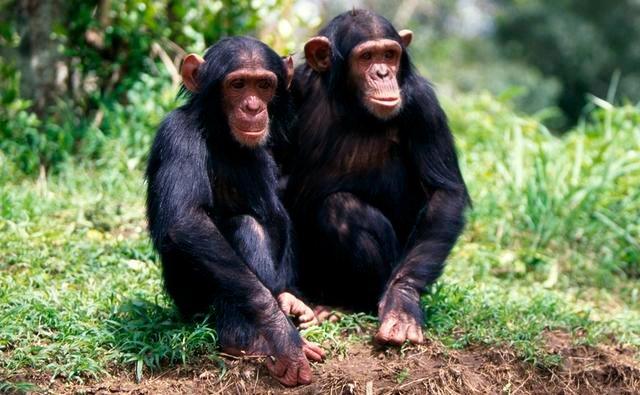Ape tantrums: Chimps and bonobos emotional about choice
- Published
One chimp, named Timi, reacted to losing a gambling game with what looked very much like a tantrum
Like many humans, chimpanzees and bonobos react quite emotionally when they take risks that fail to pay off.
This is according to researchers from Duke University in the US, who developed decision-making games that the apes played to earn edible treats.
Some animals that lost the game - receiving a bland piece of cucumber rather than a preferred piece of banana - reacted with what looked like the ape equivalent of a tantrum.
The findings are published in Plos One, external.
The researchers worked with 23 chimps and 15 bonobos in two ape sanctuaries in the Republic of Congo.
"The animals were all [rescued] orphans of the bushmeat trade," explained lead researcher Alexandra Rosati, now at Yale University.
"They're sort of in semi-captivity, but it's possible to play games with them.
"It's as close as we can come to wild animals without actually being in the wild."
Dr Rosati, who studies problem-solving in apes in order to examine the origins of human behaviour, designed two games.
In the first, the animals could choose between receiving a relatively small food reward immediately, or receiving a larger reward but having to wait for it.
The second game involved choosing between a "safe" and a "risky" option. The safe option was six peanuts hidden under a bowl. But a second bowl concealed either a slice of cucumber or a highly favoured portion of banana.
Many of the apes - both bonobos and chimps - became emotional when they had to wait or took a gamble that did not pay off.
The researchers recorded some very tantrum-like responses: vocalisations including "pout moans" and "screams", as well as anxious scratching and banging on the bars of the enclosure.
"Some of the reactions look similar to a kid [shouting] 'no, I wanted it!'," said Dr Rosati.
Emotional decisions
The results, Dr Rosati explained, suggest that the emotional component of decision-making - feelings of frustration and regret that are so fundamental to our own decisions - are intrinsic to ape society and are not uniquely human.

Emotions may have shaped the way great apes, including chimpanzees and bonobos, live
The researchers also found differences in the way the two species responded to the games; chimps were more willing to take risks, and also more patient than bonobos.
This could suggest that the apes' capacity for emotion may have helped shape the way they live.
"These differences might be reflected in differences in how the apes choose to forage in the wild," said Dr Rosati.
"This might be why chimpanzees are more likely to engage in risky strategies like hunting, in that you could spend all day pursuing a monkey, but end up with nothing.
Overall, she said that the results suggested that decision-making in apes involved moods and motivations similar to our own.
- Published15 January 2013